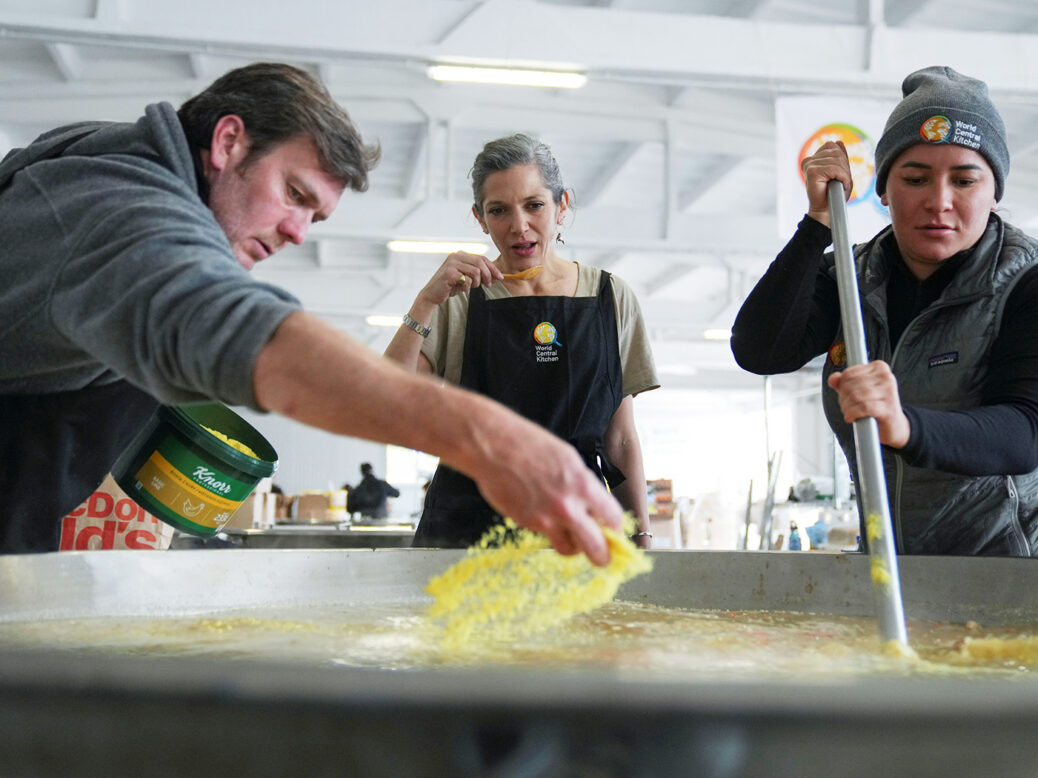
WARSAW AND KRAKÓW – Snaking through traffic from Warsaw’s Chopin Airport to the city centre, I noticed something different since my last visit to the Polish capital two years ago. Now, for almost every Polish flag flying, there is one Ukrainian one. Paper flags, polyester flags, flags lit up in neon, large and small. Signs of solidarity. Symbols of support for neighbouring Ukraine and for Ukrainians fleeing their homes who continue to arrive every day in their thousands by bus and train into Warsaw.
And I noticed something else too: a giant tent erected right by Warsaw Central railway station. After negotiating with soldiers guarding the entrance, I stepped into a giant soup kitchen with wooden tables and benches, big enough for 400 people, I was told. Tidy, organised and well-kept, it was set up by Polish corporations in conjunction with the food relief operation, World Central Kitchen, which is often found preparing meals in war zones and at border crossings.
Over a pot of bubbling goulash, I spoke to Łukasz Pałka, a trained cook and someone used to the stresses of mass catering. Since 8 March, Łukasz has been in charge of overseeing the giant vats of soups and stews made for Ukrainian citizens escaping war. In the first days of March, he and his team plated up 20,000 meals a day. Now, he told me it is about 10,000 a day. The soldiers outside check passports: if you are arriving from Ukraine, you are ushered in. At the start of the war, almost all Ukrainians arriving to the tent were from the Sea of Azov port city of Mariupol, Łukasz told me, a once-flourishing place, today in ruins after relentless Russian bombardment.
“At first, the task didn’t daunt me because I thought I was only going to be here for two or three days at the most,” Łukasz said with a quick, if tired, smile. He is no longer working 24-hour shifts though the kitchen still operates around the clock and donations turn up constantly. One day, 300 tortillas; on another, 1,200 kilograms of oranges. On the busiest days, the kitchen team has flipped 800 pancakes an hour and has cooked 600 litres of soup.
[See also: EU generosity to Ukrainian refugees could be model for asylum reform]
Now, Łukasz has a revolving team of about 50 volunteers. Some of the most useful, he explained, are cooks who are used to managing vast canteens elsewhere, people such as his helper Yana, who usually works in the kitchen of a giant copper smelter processing plant. Some of his other volunteers have come from as far away as Hong Kong and the US.
In Poland, Russia’s invasion of Ukraine feels close, not just geographically but emotionally. Many coffee shops are donating sales of drinks to Ukrainian charities. There are countless fundraising events, and the portrait of the Ukrainian president, Volodymyr Zelensky, is on the wall in some of the smartest restaurants. A Warsaw taxi driver told me that in the early days he took one of his regular customers to a hotel where the passenger paid for ten nights up front for whoever needed it. The generosity here is heartfelt and moving. But among this strong sense of united effort, there are also simmering tensions.
In Kraków I met a friend, a teacher, who is hosting a Ukrainian family, and I asked her if Poles are starting to feel the strain of taking in more than three million refugees. She told me that voiced concerns are unusual but that she has heard the odd grumble about Ukrainians being given preferential treatment at medical centres and hospitals. She added that she had also heard some older people bringing up the Volhynia massacre – between 1943 and 1945 members of the Ukrainian Insurgent Army murdered tens of thousands of Poles. “Some say, have you forgotten what Ukrainians did to us?” My friend told me she dismisses such questions vehemently, before detailing how well Ukrainian children at her school are fitting in, and how most people she knows are making sacrifices to help the greater cause.
Another friend in Kraków, a local journalist, told me that others are calling out hypocrisy over the handling of the recent border crisis on the Poland-Belarus border. People smugglers were emboldened by the Belarusian president Alexander Lukashenko – who is accused of manufacturing the emergency in response to the sanctions placed on him after his crackdown on pro-democracy protests – to encourage thousands of asylum seekers, mainly from Afghanistan, Iraqi Kurdistan and Syria, to fly to Minsk, before being pushed towards Poland. In return, the Polish government declared a state of emergency and those in the “red zone” at the border found themselves trapped in a sprawling forest between the two countries, in winter, without food, warmth or water. Many were beaten and more than 20 died trying to make the crossing. Some Poles protested in front of parliament at the terrible treatment of these refugees, while some pro-nationalists marched in towns close to the border in support of Polish security forces.
Yet for the vast majority in Poland, there is an intense desire, and a sense of responsibility, to help Ukraine; to be good neighbours and to assist desperate refugees arriving with little more than a suitcase. Poles have known all too well, and for a very long time, just what Russia is capable of. There is little sign, so far, of waning interest or war fatigue – rather, a shared understanding that help must continue for as long as it takes.
[See also: Europe divided on Ukraine war]



